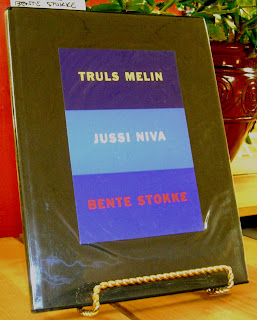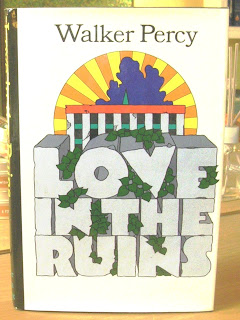Correction
Staying up late doing emails, not so good for accuracy. Please note, our winter hours are REALLY Monday – Thursday 10:00 – 6:00 p.m. and Friday - Saturday 10:00 – 9:00 p.m.New Arrivals
Texana
A Tour through Arizona by J. Ross Browne, First Edition, 1951 - $50A History of Utah’s American Indians Edited by Forrest S. Cuch, First Edition, 2000 - $45
Comanches by T. R. Fehrenbach, signed Second Printing, 1974 - $100
Lone Star by T. R. Fehrenbach, Signed, 1977 - $100
Poetry
Sonnets from the Portuguese by Elizabeth Barrett Browning, Limited edition #1 of 600, hand painted cover. 1946 - $60The Vixen by W.S. Merwin Signed, First Ed. 1996 - $75
Troilus & Cressida by Geoffrey Chaucer First Ed. 1932 - $30
From the Johann and Kristin Eyfells Library
Anti-Illusion: Procedures edited by Marcia Tucker, Associate Curator, Whitney Museum, New York, Exhibit Catalogue, 1969 - $95Hard-Edge edited by Lawrence Alloway, Exhibit Catalogue, Gallerie Denise Rene, Paris, 1967 – $125
Signs of Life, Photographs by Olivia Parker, First Edition, 1978 - $150
Einar Jonsson Myndhoggvari by Einar Jonsson, First Ed., 1982 - $150 (Icelandic)
Marcel Duchamp or the Greatest Castle of Purity by Octavio Paz, First Ed. 1970 - $95
Islenskir Myndlistarmenn, 1998, $50 (Icelandic)
Truls Melin, Jussi Nive, Bente Stokke, Nordic Pavilion Exhibit Catalogue, 1993 - $60
Children’s Collectibles
Wagging Tails by Marguerite Henry Signed, First Ed., 1955 - $95
Black Gold by Marguerite Henry Signed, First Ed., 1957 - $90
Author Birthday – Susan Sontag
Sontag was graduated from high school at the age of 15 and became a serial academic. She took classes at Berkeley and earned a bachelor's degree in philosophy from the University of Chicago after only two years of classes. She earned two master's degrees from Harvard, studied at Oxford and the University of Paris, and then, in 1959, she moved with her son to New York City. During the course of her studies she had married, had a child with, and divorced Philip Rieff, who had been one of her professors at the University of Chicago.
Susan Sontag said that she prefers to think of herself as a novelist. Her first novel, The Benefactor, was published in 1963. Her last and most popular, The Volcano Lover, came out in 2002. But, despite her success with long fiction, her essays made her famous.
In her early essays, Sontag wrote about criticism of art and culture. While most critical essays of the early Sixties were dry and academic, hers were lively and fun. Her Notes on Camp was first published in the Partisan Review in 1964. Sontag suggested that even bad art can be appreciated, that there can be "a good taste of bad taste." The essay had a huge impact on the New York intellectual world, and Sontag became a guru for the American avant garde.
In 1969, Sontag decided to try her hand at filmmaking, which fascinated her. She said it gave her the chance to exercise a part of her imagination and her powers in a way that she couldn't as a writer. But she missed writing. "I thought: where I am? what am I doing? what have I done? I seem to be an expatriate, but I didn't mean to become an expatriate. I don't seem to be a writer anymore, but I wanted most of all to be a writer."
In 1976, she returned to the literary world, focusing on short stories. That same year she was diagnosed with breast cancer. Her doctors told her she had two years to live. She searched for treatment options and found alternatives with a doctor in France. She not only survived but also wrote Illness as Metaphor (1978), which looked at the way language is used to describe disease. It was one of her most significant books. Other critical works include AIDS and Its Metaphors (1988) and On Photography (1977).
Susan Sontag's son, David Rieff, said his mother had "an unslakable kind of curiosity, of interest in the world. She is someone who can go to an opera, meet someone at two in the morning to go to the Ritz and listen to some neo-Nazi punk synthesizer band, and then get up the next morning to see two Crimean dissidents."
Sontag succumbed to complications of leukemia in Manhattan on December 28, 2004, among her personal library of 15,000 books, neatly arranged by historical period, are Egyptian, Greek, Fascism, and Communism. "What I do sometimes is just walk up and down and think about what's in the books," she said, "because they remind me of all there is. And the world is so much bigger than what people remember."
An unauthorized biography written by Carl Rollyson and Lisa Paddock and published by W.W. Norton in 2000 reported that Sontag was, for seven years, the companion of the great American playwright Maria Irene Fornes (in Sontag's introduction to the collected works of Fornes, she writes about their time together). She also had a relationship with renowned choreographer Lucinda Childs and, more recently, on and off with photographer Annie Leibovitz. (source: American society of Authors and Writers www.amsaw.org )
One more time - "What I do sometimes is just walk up and down and think about what's in the books," she said, "because they remind me of all there is. And the world is so much bigger than what people remember."
Thank you, Susan. This is one of those truths we can all agree on. You would have liked our shop.



























